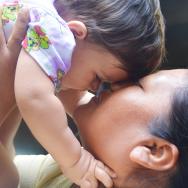For many families, finding childcare can feel like aligning several pieces of a complicated puzzle—pieces that include a sufficient supply of quality programs, affordability and scheduling.
A new study from the University of Chicago School of Social Service Administration and Chapin Hall explores how Latino families living in predominantly Latino communities in Chicago make childcare decisions given the amount of formal care nearby.
Published this week, the report draws from interviews in Chicago’s Belmont Cragin and Little Village neighborhoods with Latina mothers who have at least one child 5 years old or younger. It also relies on interviews with directors of childcare centers in both communities, and insights from community-based organizations and community members.
By considering the different sources of information used by Latino parents and the range of factors that shape their childcare decisions, this study aims to offer new information and recommendations to equip communities and policymakers to better meet the childcare needs of Latino families.
“Previous studies have explored how families understand and navigate their childcare options, although research specific to Latino families is limited,” said Aida Pacheco-Applegate, the study’s primary author and a researcher at Chapin Hall, which seeks to improve the lives of children through rigorous analysis of data-driven research.
The findings included perceptions about childcare options and availability; knowledge about public supports to pay for childcare; misconceptions about childcare options and eligibility requirements; and language barriers in learning about all of the above. As a mother in Little Village stated: “I would like for parents to know that there are many options and to know about the different payment options … I think if they knew more about these things, they would use childcare more.”
Other findings discovered how parents learned about childcare options through their formal and informal networks. Another significant concern was if mothers should seek work outside of the home and use non-parental childcare while working, while weighing the cost-benefits.
The interviews for this study were completed during 2018–19, prior to the COVID-19 pandemic and the emergency closure of many childcare programs in Chicago and nationwide. Given the timing of the study, this immediate context is not reflected in the findings.
Nevertheless, the study’s authors believe that the key takeaways and recommendations remain current—and are critical in understanding how to help Latino families by building knowledge and awareness and increasing accessibility and supply to quality childcare.
“There is a high concentration of essential workers in Latino communities, and they are disproportionately suffering serious health crises during this pandemic,” said study author Erin Devorah Carreon, a Chapin Hall associate researcher. “What makes this study so important is that we highlight potential solutions and recommendations that policy makers and community stakeholders can use to help these families access childcare during such a critical time.”
The research was made possible by grant funding from the University of Chicago-Chapin Hall Joint Research Fund but the study would not have been possible without the support of community partners.
“The Little Village Education Collaborative, Enlace Chicago and the Northwest Side Housing Center were instrumental to this work,” said Prof. Julia Henly, a scholar at SSA whose research focuses on caregiving strategies of low-income families. “The information that they—and the families in the study—have generously shared is critical to improving the childcare and early education landscape in Chicago.”
In addition to Pacheco-Applegate, Carreon and Henly, study authors include Assoc. Prof. Marci Ybarra of SSA; Emily Ellis, a doctoral student at SSA; Julie Spielberger, a Chapin Hall research fellow; and Whitney Clarke Thomas, an undergraduate student at Stanford University.
—A version of this story was first published by the School of Social Service Administration.

